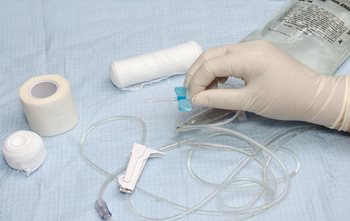
Reducing Hospitalization with Hypodermoclysis
This course provides information regarding the use of hypodermoclysis, also known simply as clysis, to achieve rehydration in patients who might otherwise require hospitalization. Dehydration is a common occurrence, especially in the older population. Clysis is an optimal means of administering non-emergent parenteral fluids in a familiar, comfortable environment. This intervention is cost-effective, easy to administer, and safer than intravenous rehydration, but many nurses are unfamiliar with the therapy. This course will prepare the licensed nurse to provide this valuable intervention, thereby decreasing the risk of hospitalization with its associated risks and costs.
In early 2024, the Infusion Nurses Society (INS), recognized as the global authority in infusion therapy, released the updated Infusion Therapy Standards of Practice. The INS sets the accepted standards for infusion therapy practice for all healthcare settings. This course is based on the current best practices as defined by the Infusion Nursing Society and other governing agencies such as the CDC, and FDA.
Questions? Check out our FAQs page and How Online IV Certification Works!
Objectives
Upon completion of this course, the participant will be able to:
- Identify at least 3 factors that contribute to dehydration in the elderly.
- Define hypodermoclysis.
- Describe the advantages, disadvantages, indications, and contraindications of hypodermoclysis.
- Describe the appropriate sites, solutions, volumes and rates for hypodermoclysis.
- Describe the procedure for hypodermoclysis administration.
- State at least 3 potential complications of hypodermoclysis.
Curriculum
Chapter 1: Dehydration
- Scope of Problem
- Contributing Factors
- Signs and Symptoms
- Assessment
Chapter 2: Hypodermoclysis Introduction
- Advantages
- Disadvantage
- Indications
- Contraindications
- Use in Terminally Ill Patients
Chapter 3: Infusion Parameters
- Sites
- Solutions
- Volume and Rate
- Hyaluronidase
Chapter 4: Administration
- Equipment
- Procedures
Chapter 5: Complications
- Systemic Complications
- Local Complications
Chapter 6: Communication and Documentation
Chapter 7: Resources
Price: $18.00
Contact Hours: 1.5

Course Author

Pamela Clark
Pamela Clark, CRNI, is an infusion nurse with the Houston Methodist Sugar Land Hospital. She has more than 35 years of experience in infusion therapy and infusion education with both licensed nurses and patients. Her experience spans multiple infusion settings including: acute care, long-term care, home infusion, and ambulatory infusion care. She also has experience in oncology and oncology research.
Read Full BioCourse Accreditation
See our Accreditation Statements page to view our accreditation information.